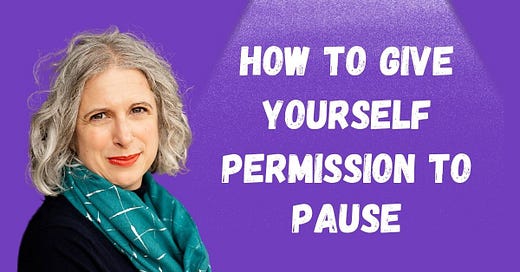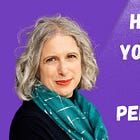Welcome to a free edition of Start Up To Grown Up: Your source for ideas, insights and tactics to take back control of your business and scale it sustainably and profitably by Heather Townsend, award-winning author of The Accountants’ Millionaires’ Club and Founder of The Accountants’ Growth Club
In the speaking world, there is a saying. The bad stuff that happens to you? That’s just material for your next story to tell from the stage.
It’s now three weeks since that fateful appointment with the rheumatologist.
In that time, I’ve been going through the emotional cycle of change. I’m now into acceptance and can see some positives starting to emerge. Funnily enough, my story is now helping my clients. Indeed, last week I sat down with 4 firm owners who all confessed to various elements of chronic fatigue: from those with a formal diagnosis to those dealing with a constant feeling of being exhausted.
During the day I spent with these firm owners, we started to reframe how we could ‘rebalance’ our day without resorting to anything spiritual or woo-woo. This article is based on the tips we shared among us.
The most important minute of your day
It turns out that ‘pushing through’ is one of the worst business strategies you can have. I learned that the hard way. My body, after years of dutifully getting on with things, finally staged a protest. First my ankle, then my wrist, then the label I never wanted, Fibromyalgia. My central nervous system went on high alert and has remained in a state of heightened alertness ever since.
The big lesson was that my greatest strength, my resilience and ability to just keep going, had become my biggest liability. It led to a constant ‘Push-Crash’ cycle. I’d have a good day, overdo it, and then spend the next two days completely wiped out, shrouded in fatigue and a comical level of brain fog. It’s why I’ve been managing an almost constant state of exhaustion for the last two or more years. My business, which I thought I was serving by working so hard, was actually being starved of its leader.
This experience forced me to learn a new strategy, one I never wanted. The strategy of pacing; which I am still discovering I have a lot to learn. The first lesson I am learning, the hard way, of course, is that my energy is not an infinite resource to be plundered, but has a finite daily budget. And this isn't just a lesson for someone with a chronic illness. This is a critical lesson for every small business owner I know.
You know the feeling. You’re trapped in the day-to-day running of the business, constantly pulled back into client work when you know you should be working ON the business. You’re firefighting, dealing with cash flow worries, staff issues, and client demands that seem to come from all angles. And you’ve not yet got to midday!
We think the answer is to work harder. To clear the to-do list. To just push through. I can’t be the only person with the bad habit of overloading my to-do list? And feeling like I am enslaved to the to-do list? But what if the answer is the exact opposite? What if the most productive thing you can do today is to stop?.
Giving yourself permission to pause
The first and biggest hurdle is permission. We feel guilty for stopping. Or being the one in the business who isn’t working the longest or hardest. This ‘pausing’ isn’t about taking regular holidays away from work. It’s about adding regular pauses into our working day.
When I looked at my heart rate data on my Oura Ring and Visible app I could see the impact of my unhealthy way of working. I’d go from meeting to task to meeting to task. Then I’d move away from work and jump onto social media. My brain was constantly on and addicted to hits of dopamine. As a result, my heart rate was raised and my body was in a permanent state of “fight or flight”. The last few weeks have taught me that I didn’t know what ‘resting’ in a working environment actually meant.
In a world that glorifies ‘the hustle’, taking a moment to just ‘be’ feels like a luxury you can’t afford. I know I felt like I could only down tools when the to-do list was conquered. It feels indulgent to take a moment when there are invoices to chase, clients to please, and a team that needs you. So we carry on, our minds racing, our shoulders tensing, moving from one task to the next without a moment’s breath. Is it any wonder that most owners of small, growing businesses report a general sense of exhaustion?
Pausing is not a weakness. But you have to give yourself that permission. No one else will. It’s a conscious decision to value your well-being as a core asset of the business. If you don’t guard your well-being, you’ll find that your business never quite moves from that troublesome teenager to the mature adult.
The five-minute reset
This doesn't have to be an hour of silent meditation. Let’s be realistic, for a busy business owner, that can feel like an impossible ask. I’m talking about starting with just a few minutes. The five minutes you claw back between back-to-back video calls.
Those of you who know me will know that I enjoy being educated and informed. So I’ve been doing my research on Fibro. It appears that Heart Rate Variability, HRV, is a good biomarker for whether my Fibro is under control and in remission. So I looked at practical ways to improve my HRV. Paced breathing, i.e. breathing in for 4-5 seconds and then breathing out for 4-5 seconds, is a great technique to switch on your ‘rest and digest’ autonomic nervous system. I.e. the bit that’s gone AWOL for me. As a result, I’ve added regular 5-minute resets into my working day.
This 5-minute reset is something you can easily incorporate into your daily work routine.
Instead of finishing one call and immediately opening the file for the next, stop. Write down the immediate stuff that you need to capture. Then close your laptop screen. Put your phone face down. Sit quietly for a moment. You can do this at your desk. Then focus on doing paced breathing, inhaling and exhaling through your nose for 5 minutes. You’ll be amazed at how much clearer your brain feels after the 5 minutes.
Journaling your way to clarity
When I was first diagnosed, I felt overwhelmed. My thoughts were a tangled mess of fear, frustration, and worry. I remembered something I had done years before to deal with chronic pain, and I started journaling again. This time around, I also asked Google Gemini for advice on what to do. Whilst Google Gemini may not be as powerful as the therapy sessions that are in my future, it did give me some very helpful advice.
For a business owner, a journal isn't a "dear diary". It's a powerful business tool. It's the cheapest, most effective consultant you will ever hire. For many of you, the biggest challenge is the constant firefighting and lack of headspace for strategic thinking. Your journal is the perfect place to solve this.
It provides a space to untangle your thoughts. All the worries, whether about cash flow, the frustration with a team member’s performance, or the anxiety about whether you’re pricing your services correctly, you can dump it all onto the page. Getting it out of your head and onto paper creates an immediate sense of relief. It frees up mental bandwidth. But it also gives you the ability to analyse your woes critically. How much of this is real? And how much of this is just unsubstantiated worry?
Once the emotional noise is out of the way, you can use your journal to work on your Growth Mindset. You can ask yourself powerful questions that you simply don't have time for during the day.
What is the one thing that is causing me the most stress right now? What is the smallest possible step I can take to address it?
If I could delegate one thing today, what would it be?
What is the real priority? Not the most urgent task, but the most important one for long-term growth?
What would this look like if it were easy?
This practice, even for just ten minutes a day, helps you process the present and plan the future. It helps you identify patterns in your behaviour and business. It’s where you can have honest conversations with yourself that are too difficult to have when you’re rushing from one thing to the next.
Finding your real priorities
I’ve been given the message that my severely restricted amount of energy means I have to prioritise like my life depends on it. And in a way, my quality of life, both current and future, really does depend on it.
Given that I no longer have the luxury of working long hours, I am now having to plan properly. That means if something is not on my to-do list, it doesn’t get done. That to-do list is reviewed daily, weekly, and monthly. Then, if the item takes more than a few minutes, it has to be planned into my diary. I continually ask myself whether my investment of energy in a task or meeting is worth it.
The problem is that as a business owner, everything feels like a priority. The client who hasn't paid. The promising lead you need to follow up with. The new software you need to implement. The staff member who needs a difficult conversation. It’s a constant battle for your attention.
The problem is, when everything is a priority, nothing is. You end up reacting to whatever is shouting the loudest, which is rarely the thing that will move your business forward. You get stuck in a cycle of reactive work that leaves you feeling busy but not productive.
Mindfulness, whether through breathing exercises or journaling, helps you cut through the noise. By creating that small space between a trigger (like a demanding email) and your response, you give yourself the chance to choose. Do I really need to respond to this now? Or can I focus on the proposal I’m meant to be writing?
For me, that small space to challenge my habitual behaviour is helping me choose better options. For example, do I really need to look at Facebook now? Or is this just an unhealthy habit? How about doing some paced breathing instead?.
Putting happiness before duty
When you're running a business, the sense of duty can be immense. Duty to your clients, your staff, your family. This sense of duty is what drives you to work long hours. But over time, this duty can start to feel like a trap. The business you created for freedom has become your cage.
In my own journey, I realised I had to change my goal. It couldn't be about getting back to the person who could push through anything. That person was gone. My new project was ‘Project Remission’. My new goal was to manage my condition so I could live a good life. I had to prioritise my own well-being, not out of selfishness, but because it was the only way to be fully present for my family and my business.
This is a big mindset shift for many small business owners. It’s about consciously putting your happiness and well-being before your endless to-do list. It’s about remembering why you started this journey in the first place. Was it to be permanently stressed and overwhelmed? Or was it to build a better life, to have more control, to feel challenged and fulfilled?
Your health, mental and physical, is the most valuable asset you have. And your body, as I discovered, really does keep the score. When you make time for a pause, for a walk without your phone, for a weekend where you don't check your email, you are not slacking off. You are investing in the long-term, sustainable success of your business. You are choosing to be the resilient, creative, and energetic leader your business needs.
Final thoughts
Your To-Do List will always be there. But it's up to you to choose what makes it onto the list. There are no prizes for working yourself so hard that you burn out or lose your passion for your business.
Your energy is a finite resource. So use it wisely.
Your action this week:
It’s time to practice the 5-minute reset. After a meeting or call, download the thoughts in your head. Then switch off your computer and set a timer for 5 minutes of paced breathing.

















Share this post